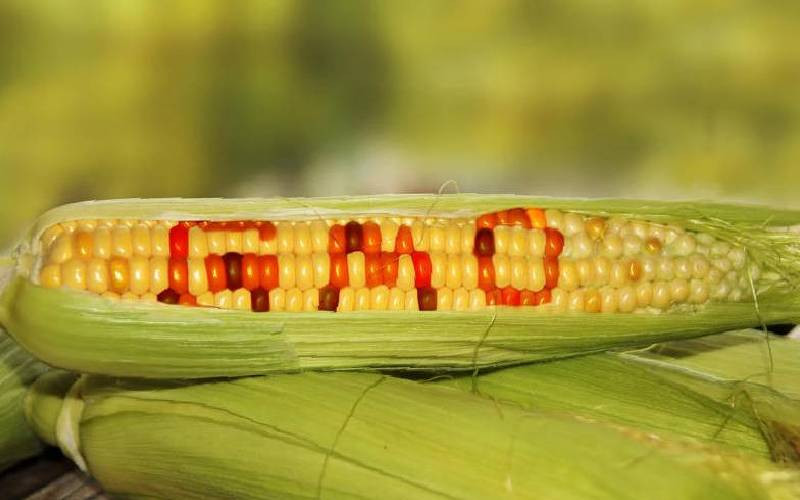 |
|
World Food Prize Laureates: They protested mandatory labeling of GMO foods (Photo: Fredrick Obura) |
By FREDRICK OBURA.
Des Moines: Push to enforce mandatory labeling in genetically engineered foods received opposition at the 2013 World Food Day in Des Moines, Iowa last week.
Delegates at the conference noted that factors such as climate change were a threat to food production leaving modern technology as a means to generate food for the 9.6 billion World population by 2015.
“We are living in interesting times when the world is faced with challenges such as the climate change, and swelling population that requires shift in the way farming is done,” said Dr Robert Fraley, Vice President and Chief Technology officer at Monsanto.
“Science is so far tested and proved as a possible means to addressing world food challenges, through modern science such as biotechnology, drought tolerant and disease resistant seeds are available, these are technologies capable of withstanding harsh conditions while producing better results,” he noted.
“Harsh policies such as mandatory labeling now common with many governments across the World needed to be toned down to allow smooth take off of GMOs in meeting food demands in the coming years,” he said.
“We are not opposed to labeling but like other food products it should not be obligatory that would be interpreted to be discriminative to GMO products,” he said.
Dr. Mary Dell Chilton, the 2013 World Food Prize Laureate noted that the biotechnology industry had made great progress in addressing concerns around the trans-genetic technology and that farmers should now be supported in adopting the new method.
“We are taking no chances in regards to standards in use of bio-tech in food production, the gene manipulation has enabled researchers come up with drought tolerant seeds, and pest free seeds that now needs to be taken out to the field,” she said.
‘It is now time we put behind myths around GMOs to meet growing food demands across the world.” She called upon governments to promote biotechnology through better policies in areas such as research within institutions and cross border trade.
For several years, the argument in favor of labeling Genetically Modified (GM) food is that consumers should have a choice in consuming or avoiding GMO products.
In July last year, Kenyan Millers, Academicians, and the business community protested a move by government to gazette a law making it mandatory for millers to label Genetically Modified Foods (GMO).
The new regulations contained in the Kenya Gazette Supplement No. 17 of 2012, Legal notice no. 40 make labeling a requirement to help consumers aware of the content of food stuff they are purchasing from retail stores.
Under the new law, importers of any GMOs must apply to the National Bio safety Authority specifying the species or identifying the amount of the GMO to be imported and its use.
Dissenting voices to the law said it was too prohibitive and likely to occasion food shortage.
Stay informed. Subscribe to our newsletter
In developing countries such as America however have overwhelmingly supported labeling of foods that have been genetically modified or engineered.
According to a New York Times poll conducted this year in July, majority (93 percent of Americans respondents) said that foods containing GMO ingredients should be identified.
Three-quarters of Americans expressed concern about genetically modified organisms in their food, with most of them worried about the effects on people’s health.
Thirty-seven percent of those worried about G.M.O.’s said they feared that such foods cause cancer or allergies, although scientific studies continue to show that there is no added risk.
Among those with concerns, 26 percent said these foods are not safe to eat, or are toxic, while 13 percent were worried about environmental problems that they fear might be caused by genetic engineering.
 The Standard Group Plc is a
multi-media organization with investments in media platforms spanning newspaper
print operations, television, radio broadcasting, digital and online services. The
Standard Group is recognized as a leading multi-media house in Kenya with a key
influence in matters of national and international interest.
The Standard Group Plc is a
multi-media organization with investments in media platforms spanning newspaper
print operations, television, radio broadcasting, digital and online services. The
Standard Group is recognized as a leading multi-media house in Kenya with a key
influence in matters of national and international interest.
 The Standard Group Plc is a
multi-media organization with investments in media platforms spanning newspaper
print operations, television, radio broadcasting, digital and online services. The
Standard Group is recognized as a leading multi-media house in Kenya with a key
influence in matters of national and international interest.
The Standard Group Plc is a
multi-media organization with investments in media platforms spanning newspaper
print operations, television, radio broadcasting, digital and online services. The
Standard Group is recognized as a leading multi-media house in Kenya with a key
influence in matters of national and international interest.










